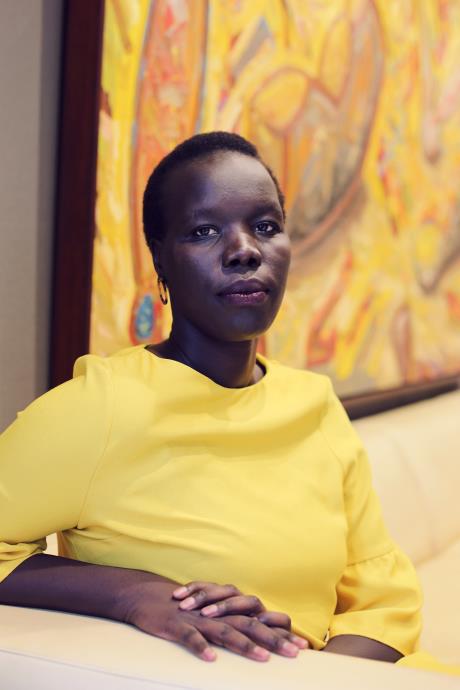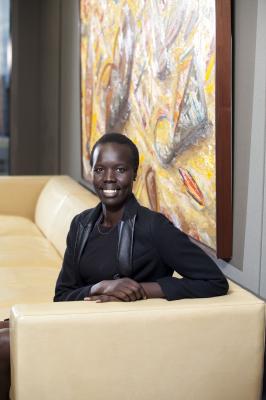In everything she does, advocate, mother and writer Nyadol Nuon strives to promote fairness. She spoke to DANIELLE KUTCHEL about working to create a more just world.
Nyadol Nuon is feeling more and more comfortable with who she is.
The renowned lawyer, writer, speaker, volunteer, mother of two and former refugee has just turned 34 and is confident in her place in the Australian community.
The Lynbrook resident was recently a nominee for the 2022 Victoria Australian of the Year. Although she didn’t take home the top gong – that honour went to tennis legend Dylan Alcott OAM – Nyadol said the experience was nevertheless “an honour”.
It’s been an incredible journey for Nyadol: born in a refugee camp in Ethopia after her family fled the Sudanese Civil War, she arrived in Melbourne in 2005 and went on to graduate from the University of Melbourne with a degree in law.
For Nyadol, law is a tool with which to create a fairer world, something she is passionate about.
Speaking of her time in the refugee camp, she said law had at one point been a distant dream.
“[Being] in a refugee camp…made you careful about what you think may happen,” she explained.
“In the camp there was no running water, no electricity, and we lived in mud-thatch houses.
“It was tough, but in a way, life had always been tough and I didn’t really know any different. It wasn’t until I settled in Australia for a couple of years that I realised how tough things were in the camp.”
The young Nyadol was determined to pursue her dreams.
“I think one of the reasons I’ve done the things I’ve done is partly influenced by the fact I was just hungry for opportunities – I threw myself into everything I could and took as many opportunities as I could because it felt like a privilege to have that level of access to opportunities.
“But the fact that I’ve had the opportunity to come to a country like Australia and be able to dream, not only dream but achieve things because you can with sufficient security and opportunities … some of it has been surprising.”
That’s not to say that life in Australia has been easy.
Nyadol is the first to admit that there have been experiences that have been “impactful in a bad way”. Some are too personal for her to delve into; others have been painfully made public.
Nyadol has been the subject of horrific online trolling and racist abuse – things that, she said, “sometimes hurt so much that you question whether you could belong in this country”.
For a time, she stepped away from her social media accounts to avoid the relentless abuse.
Initially, she said she was certain she would never return to the social media space.
But a combination of two factors encouraged her to rethink her decision.
“After about six months it provided me with enough silence and solace to realise that we cannot let our fear win,” she explained.
She also had conversations with people who told her how much they valued her perspective in the online world.
“I realised there were far more people who thought they benefited from what I did,” Nyadol said.
“I sort of came back with a different attitude. Now I block really racist or mean comments, I mute often, and I am more of myself.”
For many years now – even before she gained a media profile – Nyadol has been speaking out on discrimination and advocating for multiculturalism, human rights, refugees and asylum seekers, adding her voice to the national conversation.
She’s also an advisory committee member of the Andrew and Renata Kaldor Centre for International Refugee Law, and chair of Harmony Alliance – Australia’s migrant and refugee women’s coalition, where she’s empowering migrant women, including by improving their digital literacy.
Volunteering is a core aspect of Nyadol’s life and community.
“I have done most of these things because these are things I actually enjoy doing, but also the feeling that things need to change, you cannot keep quiet and need to be involved in it to see what you can contribute,” she explained.
“Later when you have children, that responsibility is heightened – that responsibility to create a world they can thrive in.”
For this reason, she holds concerns about many of Australia’s obligations to its citizens and its performance on global issues like climate change.
She believes Australia has the “capability to do much good” in areas like leading the fight against climate change and improving its treatment of refugees.
“At the core of it is the hope that my children can inherit a world that is much fairer and constantly improving in equality and justice,” Nyadol said.
Having now returned to social media, and with a regular gig as a columnist with The Age, she plans to continue contributing to the national conversation on the issues she holds dear, focusing on creating a better world for those to come.
“I just sort of do what I need to do,” she mused.








